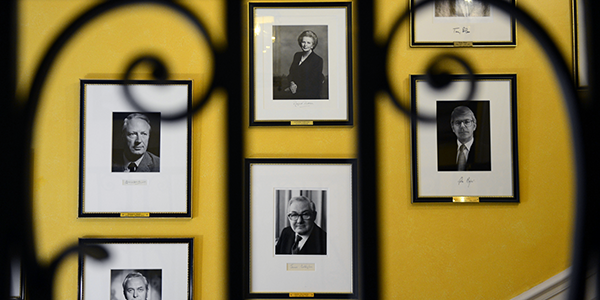What makes a Prime Minister great?
On the day one occupant of Number 10 Downing Street leaves office, and another enters, Ben Worthy assesses how the British public rate previous Prime Ministers, and how the tricky mantle of ‘great’ tends to depend on fickle collective memories, partisan politics – and war.

Portraits of former Prime Ministers in 10 Downing Street. Picture: Number 10 / (CC BY-NC-ND 2.0) licence
Theresa May, as she departs, and Boris Johnson, as he arrives, should now be made aware of my most devastating political anecdote. In around 2008 or so, someone rang me from a pub quiz to ask me if John Major had ever been Prime Minister. When I said he was there for seven years the response was a combination of sheer incredulity and pure profanity. Like every other leader, May entered Downing Street hoping to be written into the history books but she should remember she can, and probably will, just as easily disappear into a pub quiz black hole. It’s even harder for so-called takeovers, who come into power without a general election win and on average get just three years in the job.
In the nick of time for May’s departure and Johnson’s arrival, up popped a poll by YouGov asking the public about the greatest Prime Minister since World War Two. Surveys like this provide hours of fun, though I use the term ‘fun’ relatively. We need to be a careful about these polls, of course. One famous (possibly apocryphal) poll found a surprisingly high proportion of those polled could name Lenin – but a large number of those who could thought his first name was ‘John’.
Despite this, these polls tell us something about how we remember, forget and think, or don’t think, about our Prime Ministers. Twitter was momentarily set alight by the fact that Thatcher won the poll with 21% of the vote. Churchill then came second with 19%. Tony Blair was third on 6%, followed by Clement Attlee on 5% and Harold Wilson on 4%. The others got more-or-less none – but dig down into the detail and you can see that 2% of those polled thought David Cameron was the greatest post-war Prime Minister. I can only assume that some part of Cameron’s extended family was caught up in the poll sample. Theresa May got 0%.
This result was great news for Thatcher fans. Yet there was also something for, how do I put it, the Thatcher non-fans too because her number one achievement was, according to the poll, ‘being the first female Prime Minister’. This is something that would probably disappoint her. Thatcher spent more than a decade in Downing Street trying to thrash Argentinians, miners and Europe, while selling off the family silver. She was famously anti-feminist and pretty lukewarm about the achievements of any woman except Margaret Thatcher. She complained in her memoirs that ‘I was always asked how it felt to be a woman Prime Minister. I would always reply “I don’t know, I’ve never experienced the alternative”’.
Churchill did well to come second with 19%, given this was the 1950s Winston Churchill not the 1940s one. This isn’t the Churchill who stuck two fingers up at Hitler but the one who was so incapacitated at one point that his son-in-law ran the country on the quiet and who was in the top post when Britain ran its own gulags in Kenya (where Obama’s grandfather was tortured, among many others).
Then we get to Blair. Tony ‘Iraq’ Blair came just ahead of Clement ‘built the NHS’ Attlee. To many people this seemed to be wholly unjust. Part of the problem is that most people can actually remember Blair but Attlee is very much a figure of the history books. And if we open up one of those history books things get a little more interesting. All my memories of Blair are dominated by Iraq but he also helped bring peace to Northern Ireland. According to this calculation, Tony ‘Robin Hood’ Blair also redistributed the most wealth from rich to poor of any government. Attlee gave us the NHS but also was in part responsible for the horrors of partition in India. He wasn’t always so well regarded, either. Back in the 1940s, George Orwell wrote of how ‘Attlee reminds me of nothing so much as a recently dead fish, before it has had time to stiffen’.
This leaves us with Harold Wilson, my personal favourite. He won four, yes four, general elections and a referendum on Europe while also keeping the UK out of the Vietnam War. And for those who want to tell me he wasn’t left-wing enough – well he had his own KGB code name.
Prime Ministers always feel the double grip of the hands of history and greatness on their shoulder from the moment they enter the black door. Churchill himself wrote about how this felt, with his famous passage on becoming Prime Minister in May 1940:
I felt as if I were walking with destiny, and that all my past life had been but a preparation for this hour and for this trial…I was conscious of a profound sense of relief. At last I had the authority to give directions over the whole scene.
Churchill claimed he was ‘sure he would not fail’ and told of how ‘I slept soundly and had no need for cheering dreams’ though other sources paint a far bleaker portrait, with Churchill weeping on his appointment and admitting that he feared it was ‘too late’. Thatcher quoted the Elder Pitt, The Earl of Chatham, who said on his arrival in power ‘I know that I can save this country and no one else can’. Pitt himself, depending on our point of view, was the saviour of his country or a war-mongering Europhobe. Though they both sound a little over-done, they are both more promising routes to greatness than trying to make a joke out of the word ‘dude’ to a group of uncomprehending Tories. The public are pretty unconvinced too. Only 20% in this poll think Johnson will be great/good whereas 50% think he’ll be poor or terrible.
But greatness is a slippery thing. We can vaguely agree that things like saving the country in peril or bringing peace can make a leader great. But beyond that it gets very political. Many of the ‘great’ achievements of Prime Ministers in the twentieth century are pretty contestable. How does Lloyd George winning the First World War look now? Or Edward Heath getting Britain into the EEC?
One final worrying trend in the poll is that the top three ‘great’ Prime Ministers are all associated with wars, despite the fact that, as Yoda so wisely pointed out, wars make not one great. They are all also leaders who supposedly got ‘things done’, something our new Prime Minister also promises to do. But sometimes, as I point out when DIY is looming, doing nothing is the best policy.
This post represents the views of the author and not those of Democratic Audit.
About the author

Ben Worthy is Lecturer in Politics at Birkbeck College, University of London. He is the author of The Politics of Freedom of Information: How and why governments pass laws that threaten their power.





 Democratic Audit's core funding is provided by the Joseph Rowntree Charitable Trust. Additional funding is provided by the London School of Economics.
Democratic Audit's core funding is provided by the Joseph Rowntree Charitable Trust. Additional funding is provided by the London School of Economics.